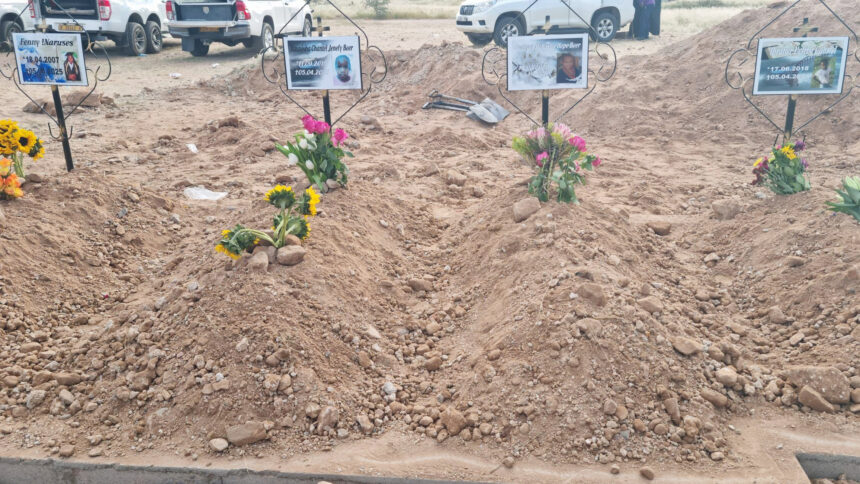USAKOS – “My mother lived for her grandchildren. Her ultimate goal was to take care of them until she leaves this earth, and we believe she fulfilled her dream, just the way she wanted.”
These were the words of Karl !Naruseb, the grieving son of ‘Ouma’ Elisabeth Katrina !Naruses (86), who was laid to rest alongside her grandchild and great-grandchildren at Usakos on Saturday.
Clergymen, politicians and government officials joined the grieving family in paying tribute.
!Naruseb paid an emotional tribute to his mother, who was killed on 1 April alongside her granddaughter, Fenny !Naruses (17), and her great-granddaughters, young Ibra !Naruses (6), Raunisha Boer (6), Rachel Boer (3) and Emi !Naruses (3).
All six were brutally eliminated in a tragic incident allegedly at the hands of Fenny’s twin brother, whose name cannot be revealed as he is still a minor.
Describing his mother, Naruseb said she was a passionate, nurturing woman who lived for her family. “Nobody could stand between the love she had for her grandchildren. She always reminded us that family must be there for each other. She had a vision to look after them until God called her. This was her wish,” he said. “She wanted to be buried like president (Hage) Geingob,” he added.
The tragedy, with its many unanswered questions, stunned the entire nation, resulting in people from all corners of Namibia showing up in Usakos to mourn with the family.
The mood was sombre, as angelic voices and speaker after speaker tried to uplift the spirits of the family, who were battling to come to terms with the grim reality, staring at the six coffins lined up next to one another.
In one corner, the murdered children’s mothers stared at their little coffins, as if trying to awaken them from a deep sleep. Their faces told a story of emptiness and loneliness, despite being surrounded by so many people who came to support them.
Silently, they wept for their children, whose lives were cut short in the most brutal manner.
“How will I ever forget this…? How do I make sense of this?” one mother whispered as she prepared to say her final goodbyes at the cemetery.
One life too many
Gender Equality and Child Welfare minister Emma Kantema, who attended the funeral on behalf of the government, said a life lost is one too many.
“Standing here, in front of six coffins, is deeply disturbing and shocking. We must deeply reflect on what is happening to our society. Where did we lose our way? We need to stand together as a nation and fight the evils that are destroying our families,” she appealed.
Bernadus Swartbooi, leader of the Landless People’s Movement (LPM), called for an honest conversation about the deeper causes of such tragedies.
“We should not just mourn today, and then continue as if nothing happened. This is not only a government or councillor’s problem. It is a deeper social wound – one fuelled by broken homes, substance abuse and neglect,” he said. Swartbooi added that true healing would only come if communities return to the values of unity, compassion and vigilance.
“If we do not change how we raise our children and care for each other, we will gather like this again and again,” he observed.
Bishop Sagues !Kheib, presiding over the funeral, praised Namibians for their kindness and solidarity. “Your presence is a comfort to a grieving family, and a reminder that goodness still exists,” he said.
Reflecting on the lives lost, the bishop said Ouma Katrina’s home had been a haven for many. “She did not have riches to give. What she had was love — and she gave it freely,” he noted, adding that both Fenny and her nieces had a promising future.
“Sadly, her journey ended before it truly began.”
Forgiveness
In a powerful moment, the bishop urged mourners to pray for the alleged perpetrator as well. “It is painful, but he too comes from this family. He too is lost. Only prayer can heal what man cannot fix,” he emphasised.



